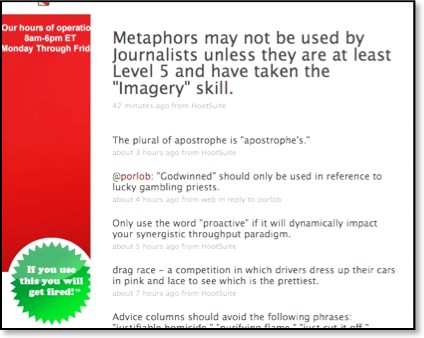Archiving Twitter
But the Library of Congress, the 210-year-old guardian of knowledge and cultural history, thinks so.
The library will archive the collected works of Twitter, the blogging service, whose users currently send a daily flood of 55 million messages, all that contain 140 or fewer characters.
Library officials explained the agreement as another step in the library’s embrace of digital media.
Twitter, the Silicon Valley start-up, declared it “very exciting that tweets are becoming part of history.”
Read more at the NYT.
3,7000 tweet-long novel
Who says 140 characters isn’t enough to say something constructive? Matt Stewart is writing an entire novel that way.
Yes,
Stewart is publishing his entire 480,000 character
book at 130 characters at a time (to leave room for
hashtags and links) on Twitter. To be clear, the
book, called The French
Revolution... is already written. But Stewart and
his agent couldn’t get any publishers to bite, so
they decided to go the non-traditional route, to say
the least.
Here’s
how this works: Every so often, Stewart is tweeting
out sentences (or incomplete sentences) from the
book. No, he’s not doing this by hand, he got a
programmer to help him automate the process. The
result is slowly spilling out the entire narrative of
the book to his Twitter
feed.
If you think this would be impossible to follow in a regular stream of tweets, you’re right. That’s why Stewart has a website chronicling the whole story thus far (or, of course, you can simply click on his Twitter page to read it — though backwards). Stewart expects that will will take about 3,700 tweets to get the full story out there.
All this social networking stuff - is it making us ADD?
Here are some of Dr. Goodman’s recommended techniques:
Screen your screens. Turn off all your screens, when you have work to do.
Grey out the Blackberry. You may not be able to turn it off, but figure out how to set the vibrator to only go off when your boss is trying to reach you.
Slot your communication time. Set an alert to check your Twitter stream just once an hour. Establish a practice of checking your email twice a day, at set times, such as 10 a.m. and 3 p.m. Check everything else on your own time.
Slot your ‘to do’ time. This is the hard one. The natural tendency is to just let the ‘To Do’ list build up and then tackle each item, when there’s time. Make time. Assign an hour to each item, just like it was a meeting or event. Close the door. Do it.
If your day and your focus is still breaking down, you’re going to have to even set some time up for figuring out what your priorities really are (and why) as well as setting (then hitting) deadlines.
All this may mean you’ll have to resist the ethos of the social media and electronic communications that almost has come to be:
I twitter, therefore I am.
15 twitter apps you might need
Everything Twitter
And why? Well, that's more complex. It can be a terrific time waster. Or it can be a way to develop relationships. Only you can say if it is worth the time to you. But, what if editors and publishers were on there (which they are) and you could read about their thoughts? I have yet to see one announce a nice new book ready for an indexer, but it is one way into communication that is easier than cold calling.
